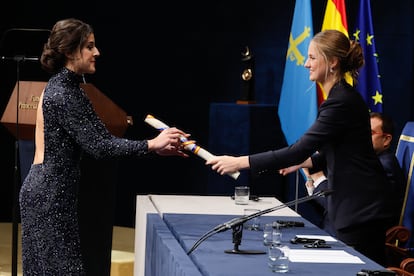“But didn’t Goebbels have a doctorate in philosophy? Hadn’t Dr. Mengele taken the Hippocratic Oath?” asked Marjane Satrapi, Princess of Asturias Award winner for Communication and Humanities. The Franco-Iranian author was finally able to attend the awards ceremony after having canceled her presence during the events the previous week due to serious family problems. And once here, in Oviedo, in the most powerful and visceral speech of the evening, he reflected on what makes us human: not only compassion, but also violence.
“Among what biologists call authentic animals, that is, mammals, man is the only one who kills his female,” he added. Education, as you showed in those questions you asked at the beginning, does not always make us better. Perhaps it is that we understand it wrong: “Perhaps before educating our children to be economically and socially successful, we should teach them that true success lies above all in humanism,” said the author. And he added: “Man alone does not survive in nature. It only survives by joining with others and creating societies. and the condition sine qua non to achieve this is empathy.”
Full of reflections on humanity, the solemn ceremony of the Princess of Asturias Awards took place this Friday, like every autumn, at the Campoamor Theater in Oviedo, in the presence of national and regional political and cultural elites: Francina Armengol, president congressional; Pedro Rollán, from the Senate, and Cándido Conde-Pumpido, from the Constitutional Court. Ministers such as Pilar Alegría, of Education; Diana Morant, from Science; or Ernest Urtasun, from Culture. Or the head of the opposition, Alberto Núñez Feijóo, of the PP. Everyone passed along the dark blue carpet at the entrance to the theater, around which journalists and curious onlookers gathered under a thin, intermittent rain, very Asturian, which was finally respectful.
In the nearby Plaza de la Escandalera, the traditional republican demonstrations were also present (they waved tricolor and Palestinian flags), overshadowed by so many bagpipes (24 piper bands and 10 folk groups parade through the streets of Oviedo, a parade of more than 800 people) .
Solemn ceremony
Queen Sofia, as is traditional, sat, applauded, in a side box. Then came the entrance of the Royal Family, which presided along with the president of the Principality, Adrián Barbón, and that of the Princess of Asturias Foundation, Ana Isabel Fernández. Once the event opened (after the national anthem played, of course, on bagpipes), the winners appeared to the sound of the fanfare. Ayres for Cornetts and Sagbutsby John Adson, composer of the early English Baroque. Increase in decibels and noise for Joan Manuel Serrat, Carolina Marín and Marjane Satrapi. On one side of the scene were the trophy statues, designed by Joan Miró for the awards, weighing eight kilos each. They are still made and numbered by hand in the workshop where the Catalan artist worked.
Another Catalan, Joan Manuel Serrat, winner of the Arts, made an ontological manifesto about himself, with which a song could be made: “I am a person in favor of life.” “I do not like to witness atrocities without unanimous and forceful responses”. “I am not satisfied with seeing dreams stranded on the other bank of the river.” And then, when no one in the audience expected it, she did what she does best: sing a song, accompanied by the violin. One of his classics: Those little things.
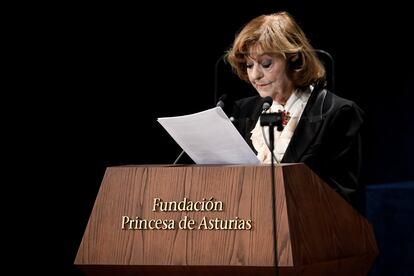
In her speech, the poet Ana Blandiana, winner of Literature, gave a brief review of the ancient and recent history of her country, Romania, that “Latinity, exiled at the other end of the continent”, with special emphasis on the communist regime , and asked a classic question: Can poetry save the world? “As incredible as it may seem, during the 1950s and 1960s, authentic resistance through poetry occurred in the communist prisons of Romania,” it was answered.
Since pencil and paper were prohibited in communist prisons, three people were needed for the poetic act: the one who composed the poem, the one who memorized it, and the one who transmitted it in Morse. This is how thousands of traveling poems were composed between cells and prisons. “Poetry was turned to as a means of salvation.” Blandiana concluded with a curious comparison between monarchy and poetry. This prize, he said, “combines the mystery of poetry and the mystery of royalty, so strangely related to each other to the extent that people, without understanding them and without knowing what they are for, feel that without them everything would be less beautiful and less good.”
“The fox knows many things, the hedgehog knows only one important thing,” the thinker Isaiah Berlin once noted. His biographer, Michael Ignatieff, winner of the Social Sciences Prize, started from this distinction to create his speech, in which he reflected on his merits for this award. Given his polymath (teacher, writer, journalist, academic, politician), he considers himself a fox. But with nuances: “Some foxes envy the hedgehog’s constant and determined tenacity, along with its ability to curl up into a ball and show its quills when facing those who attack it. “I am one of those foxes who always wanted to be a hedgehog,” said the Canadian, in the most personal speech of the event. “Thank you, your highness, you have made an old fox happy.”
“I don’t like witnessing atrocities”
The winners, those who spoke, and also Daniel J. Drucker, Jeffrey M. Friedman, Jens Juul Holst and Svetlana Mojsov (Scientific and Technical Research Award), Carolina Marín (Sports), Cristina de Middel, Thomas Dworzak and Olivia Arthur , from the Magnum Photos agency (Concordia), and Mario Jabonero, secretary general of the Organization of Ibero-American States (International Cooperation), took turns receiving the precious diploma from the hands of Princess Leonor, surrounded by applause. In the stalls, the singer Ana Belén, sitting next to Víctor Manuel, cried like a cupcake when Serrat presented the diploma to the public. Magnum photographers came out with their cameras in hand and jokingly took photos of the audience and each other.
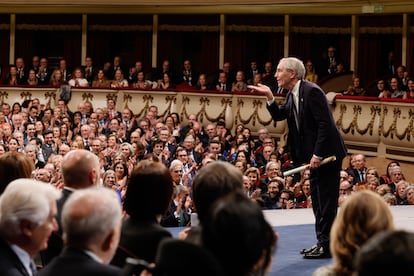
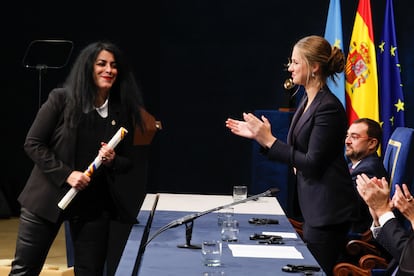
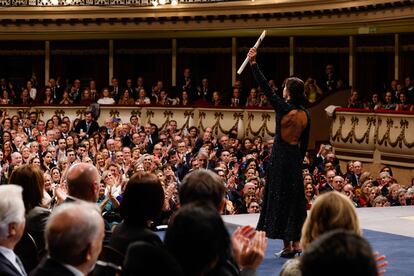
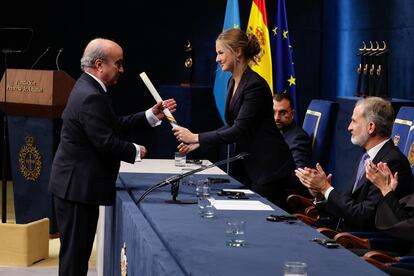
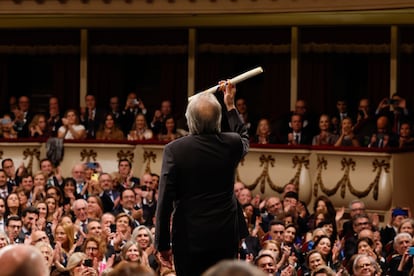
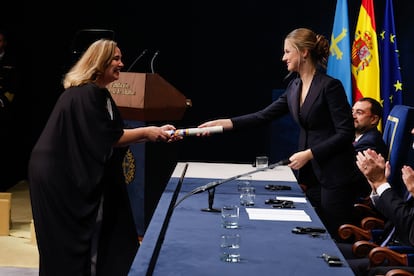
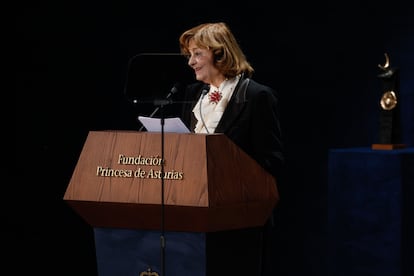
Ballesteros (EFE)
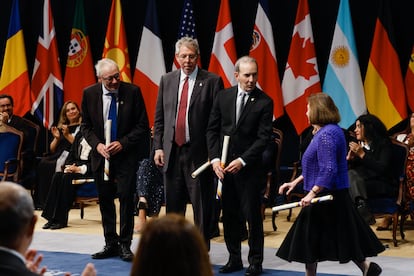

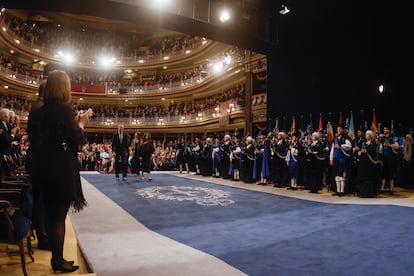
Ballesteros (EFE)
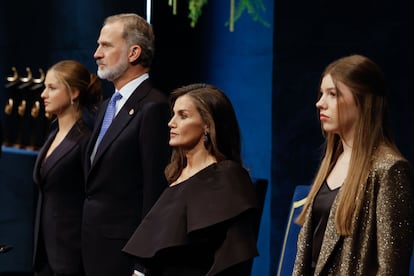
Ballesteros (EFE)
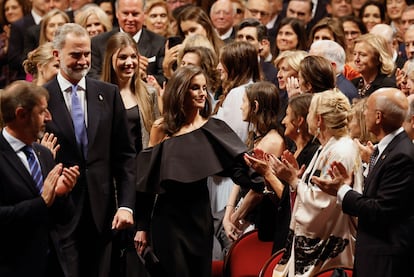
Ballesteros (EFE)
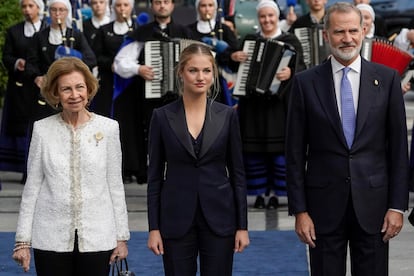
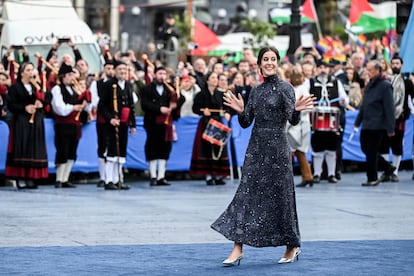
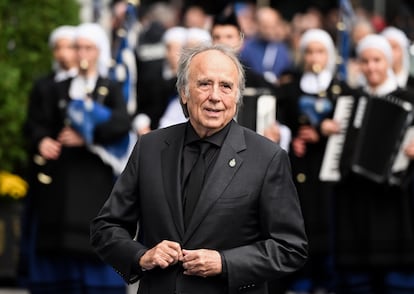
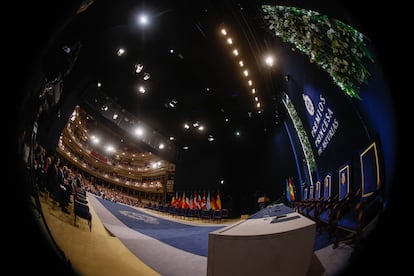
Ballesteros (EFE)
After the speeches of the Princess of Asturias and the King, in which the princess praised, for the first time (until now the King did so), the winners and Felipe VI warned of the dangers of polarization and dehumanization, the Royal City of Oviedo Bagpipe Band accompanied with the parade The Xarreru the exit of the winners through the central aisle of the theater.

